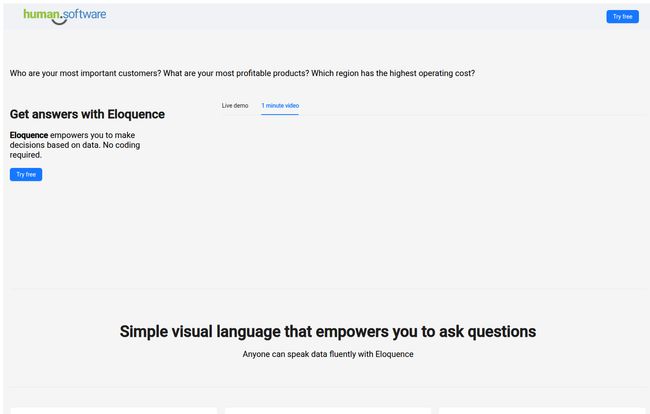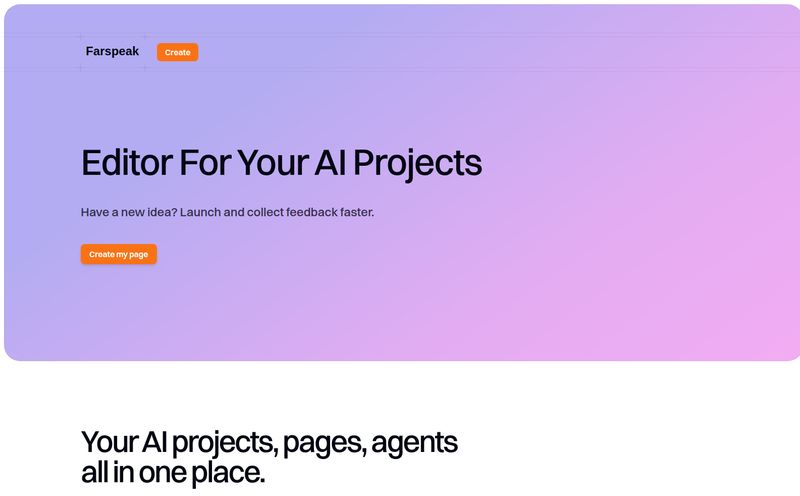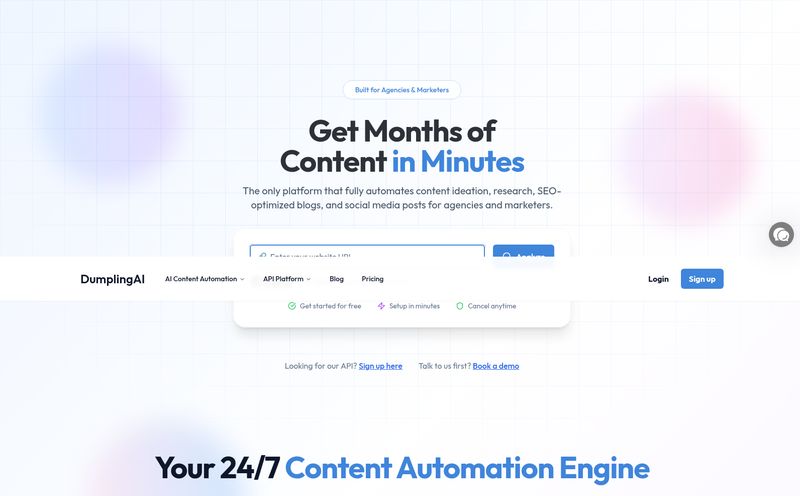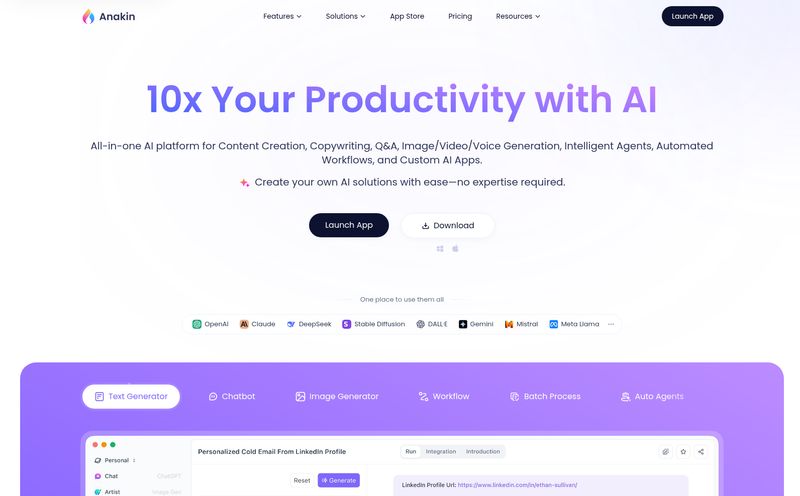If you've ever been in a marketing meeting, a product review, or a strategy session, you know the drill. Someone asks a seemingly simple question: "Which region has the highest operating cost?" or "What are our most profitable products this quarter?"
And then… silence. Or worse, the dreaded, "I'll have to ask the data team to pull that." Which translates to a ticket, a two-day wait, and a spreadsheet that doesn’t quite answer the original question. We've all been there. It’s the digital equivalent of trying to ask for directions in a country where you dont speak the language.
For years, the promise of business intelligence (BI) was that it would make everyone a data whiz. But let’s be honest, for most of us, tools like Tableau or Power BI come with a learning curve steeper than a vertical climb. So when a tool like human.software comes along and says you can just ask your data questions in plain English, my inner skeptic raises an eyebrow. But my inner, overworked marketer leans in, very interested.
So, What's the Deal with human.software?
At its core, human.software is an AI-powered data analysis platform designed for, well, humans. The big idea is to eliminate the middleman—whether that's a data scientist or a complex piece of software. You connect your data source, and then you start asking questions. No SQL, no Python, no need to build complicated dashboards from scratch.
They call their natural language query feature "Eloquence," which is a nice touch. It's not about typing code; it’s about having a conversation. You ask, "Who are my most important customers?" and it gives you an answer. Instantly. It's what BI tools have been promising for a decade, but this feels… different. It feels more direct.

Visit human.software
This approach strips away the layers of technical nonsense that usually gatekeep data. It’s like having a universal translator for the language of databases. Instead of learning the database's language, you get a tool that learns yours.
The "Zero Hallucination" Promise is a Big One
Here’s where it gets really interesting. If you've played around with any AI lately, you've probably experienced a "hallucination." That’s the polite term for when the AI confidently makes stuff up. It can be funny when you're asking it to write a poem about a cat who loves lasagna, but it's terrifying when you’re making six-figure business decisions based on its output.
Human.software boldly claims to have zero hallucinations. How? It seems their secret sauce is a verification mechanism. While they don't spell out the exact technical details, the implication is that the tool shows its work. It allows you to check the AI's output, so you're never just blindly trusting a black box. This is huge. It builds a bridge of trust that has been missing from so many conversations about AI in business. I once asked a generative AI to summarize a report and it invented a whole new—and completely false—conclusion. The experience left me with some serious trust issues, so this feature alone is a massive selling point for me.
Key Features That Actually Make a Difference
Going through the feature list, a few things stand out as genuinely practical, not just marketing fluff.
Speaking Your Data's Language with Eloquence
The ability to use natural language is the main event. The fine print does mention that it might work best with a "structured natural language query." This isn't a bad thing. It just means you might need to be clear and specific, like asking "Show me total sales for Product X in Q2" instead of a vague "How's Product X doing?" Honestly, that's just good practice for getting clear answers from anyone, human or AI.
Security That Lets You Sleep at Night
Okay, this is a big one, especially for any company that handles sensitive customer information. Human.software seems to take this seriously. They talk about industry-strength encryption for data both at rest and in transit. More impressively, they have two deployment options: online (cloud-based) or on-premise. The on-premise option means you can host it within your own company's firewall, which is a requirement for many finance and healthcare companies. And the real kicker? They don’t save your data. The data is transferred from your database to the server for the query, and then to you. Nothing is logged or stored. That’s a massive statement of confidence and respect for user privacy.
It’s Actually Quick and Easy
The website promises instant results, cutting out the IT department or data science team as a bottleneck. This speed is critical when you're in the flow of analysis. You ask a question, get an answer, and it immediately sparks another question. A slow tool breaks that creative cycle. They even list "Initial account creation may take up to 5 seconds" as a potential con, which is pretty funny. If waiting five seconds is a problem for you, you might need more than a data tool.
Who Is This Tool Really For?
I see this being a game-changer for a few specific groups:
- Marketers: Quickly analyze campaign performance, identify top-performing channels, and understand customer segments without waiting for a report.
- Small Business Owners & Founders: Wear all the hats? Now you can be your own data analyst. Ask about inventory, sales trends, and customer behavior on the fly.
- Product Managers: Get immediate answers on feature adoption, user engagement, and bug report trends.
- Business Analysts: Spend less time pulling data and more time actually analyzing it and forming strategic insights.
It’s for the curious, the proactive, the people who just want answers without needing a computer science degree. If you're a hardcore data scientist who loves crafting complex SQL queries and building models in Python, this probably isn’t for you. This is for the other 99% of us.
The Million-Dollar Question: What's the Price?
And here we are. The pricing page. Or, the lack thereof. Human.software doesn’t list public pricing on their site. This usually points to a sales-led, enterprise model where pricing is customized based on team size, data volume, and whether you choose the on-premise or cloud version.
While I always prefer transparent pricing, this approach is common for B2B tools with serious security and deployment options. The best bet is to use their "Try Free" button to start a conversation and get a custom quote. It’s an extra step, but for a tool this specialized, it makes sense.
My Honest Take: The Good and The Quirks
Let's break it down without any sugarcoating.
| The Good Stuff (Pros) | The Quirks (Cons) |
|---|---|
| No coding is a massive barrier removed. It's incredibly accessible. | You might need to phrase your questions clearly and specifically. Not exactly a hardship. |
| The zero-hallucination claim, if it holds up, is revolutionary for AI in business. | The 5-second account setup time. I'm still laughing. |
| Top-tier security features, especially the "no data saved" policy and on-premise option. | |
| Instant results mean no more waiting around and losing your train of thought. |
Is It Time to Start a Conversation with Your Data?
Look, the gap between the data we have and the answers we need has been a source of professional frustration for years. Tools like human.software represent a genuine shift in closing that gap. It's moving data analysis from a specialized, technical skill to a simple, conversational one.
The combination of a no-code interface, the promise of trustworthy AI, and a serious approach to security is compelling. It’s a tool that seems to respect both your time and your data. If you’re tired of feeling like your own business data is a black box, this might just be the key.
Frequently Asked Questions
How do I create an account on human.software?
According to their site, you just click the "Try Free" button, enter your email and a password, and click "Login/Signup." They warn it might take a whole 5 seconds, so be patient!
What kind of data sources can I connect?
The website doesn't specify a list of supported databases or platforms. This is likely something they discuss during the onboarding process, as different businesses will have different needs (e.g., PostgreSQL, Snowflake, Google BigQuery, etc.). Your best bet is to ask their team directly.
How does human.software keep my data secure?
They use a multi-layered approach. First, all data is encrypted both when it's being transferred and when it's being temporarily processed. Second, they explicitly state that no data is ever saved, logged, or otherwise stored on their servers. And third, they offer an on-premise deployment option for maximum control.
Is the 'zero hallucination' feature for real?
This is their main selling point. While any AI has the potential to misinterpret things, human.software's claim is based on a system that lets you verify the AI's work. It's designed to prevent the AI from inventing facts by making its process transparent to the user, ensuring the answers are grounded in your actual data.
Do I really need zero coding skills to use this?
Yes, that's the entire premise. The interface is built around asking questions in plain, natural English. You don't need to know SQL, R, or Python. You just need to know what you want to ask.
Is there a free trial for human.software?
The site has a prominent "Try Free" button. This likely leads to a demo, a free trial period, or a sandbox environment where you can test the tool's capabilities. It's the best way to see if it fits your needs before any commitment.
Reference and Sources
All information for this review was sourced from the official product website:
- human.software official website: https://human.software
- For further reading on AI Hallucinations, check out this explainer from Google Cloud.



